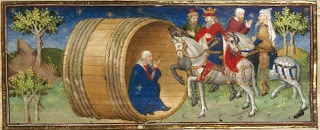Thursday, October 31, 2013
Monday, October 28, 2013
Thomas Wolfe
Among the fraternity of word-drunk Hegelians we must not forget Thomas Wolfe: "At the University of North Carolina he studied under Horace Williams, a philosophy professor whom he represented as Vergil Weldon and whom he called 'Hegel in the Cotton Belt.' Williams, who was a mystic, taught him a rather loose form of the Hegelian dialectic, in which a concept, or thesis, inevitably generates its opposite, or antithesis, and the interaction of the two produces a new concept, or synthesis" [C. Hugh Holman, The Loneliness at the Core: Studies in Thomas Wolfe, Baton Rouge: LSU Press (1975), 6].
Saturday, October 26, 2013
Hegel Revisited
Only someone completely drunk on the logos could write the Phenomenology of Spirit. And only those who have tasted the logos for themselves and read the Phenomenology with care--taking note of the author's mania, the signs of his affliction--can rise against it and through it to the pinnacle of their own genius.
But this is only as it should be: for the Hegelian thesis demands antithesis. The ensuing conflict is the source of profound creativity and productivity. And no one understood this--nor could have understood this--better than sly Hegel himself.
Without Hegel, Kierkegaard would not have been Kierkegaard, nor Feuerbach Feuerbach, Marx Marx, Dewey Dewey, Sartre Sartre, etc.
If we do not bother to revisit Hegel from time to time, we cheat our intellects; he was a volcanic force of nature, withering in its intensity but, for all of that, indispensable.
Sunday, October 20, 2013
Feuerbach
Feuerbach's thought is an objective measure of scholarly candor: the degree to which we continue to resist Feuerbach in the academic study of religion is the degree to which we continue to function as crypto-theologians.
Feuerbach's Doctrine of Food
"The doctrine of foods is of great ethical and political significance. Food becomes blood, blood becomes heart and brain, thoughts and mind-stuff. Human fare is the foundation of human culture and thought. Would you improve a nation? Give it, instead of declamations against sin, better food. Man is what he eats" [see Hayden White's article "Feuerbach" in the Encyclopedia of Philosophy, ed. by Paul Edwards, vol. 3-4, 192].
Saturday, October 19, 2013
John Dewey's Naturalistic Humanism
"Ultimately there are but two philosophies. One of them accepts life and experience in all its uncertainty, mystery, doubt, and half-knowledge and turns that experience upon itself to deepen and intensify its own qualities--to imagination and art. This is the philosophy of Shakespeare and Keats." Art As Experience, 35.
Thursday, October 17, 2013
Wednesday, October 16, 2013
Wittgenstein's Last Words
"Tell them I've had a wonderful life!"
The beauty of these words lies in the fact that they were uttered without irony.
Sunday, October 13, 2013
Heroes of Humanism: Abu Yusuf al-Kindi (d. 873 CE)
A distinguishing characteristic of all humanists is their cosmopolitan acceptance of sources of inspiration and authority outside of the traditions they inherited as a consequence of the accidents of their birth. In this regard, al-Kindi was exemplary:
We should not be ashamed of recognizing truth and assimilating it from whatever source it may reach us, even though it might come from earlier generations and foreign peoples. For him who seeks truth there is nothing of more value than truth itself. It never cheapens or abases him who searches for it, but ennobles and honors him.
--al-Kindi, On First Philosophy.
Friday, October 11, 2013
Cosmopolitical Thinking
"...when Alexander the Great broadened the Greek horizon beyond its former preoccupation with single cities, we find Stoic philosophers fusing the 'natural' and 'social' orders into a single unit. Everything in the world (they argued) manifests in varied ways an 'order' which expresses the Reason that binds all things together. Social and natural regularities alike are aspects of the same overall cosmos + polis--i.e. cosmopolis. The practical idea that human affairs are influenced by, and proceed in step with heavenly affairs, changes into the philosophical idea, that the structure of Nature reinforces a rational Social Order." --Stephen Toulmin, Cosmopolis, 68.
Wednesday, October 9, 2013
The Road to Cosmopolis
The founding fathers of Cosmopolis are (1) the Hellenistic sages: the Cynics, Epicurus, Lucretius, Seneca, Epictetus, Marcus Aurelius, and Sextus Empiricus; (2) the Muslim humanists: al-Kindi, the "school of Farabi" (from al-Farabi to Ibn Miskawayh), Ghazali, Saadi, and Nasr Abu Zayd; and (3) Montaigne.
The citizens cultivate an urbane, literate, skeptical cosmopolitanism that is perfectly at home with the natural piety of a Spinoza, Thoreau, Tolstoy, or Santayana. Theirs is a humanism of the disenchanted sublime.
Monday, October 7, 2013
Aldous Huxley
"...the ultimate Reality is not clearly and immediately apprehended, except by those who have made themselves loving, pure in heart and poor in spirit." The Perennial Philosophy, x.
Subscribe to:
Posts (Atom)












